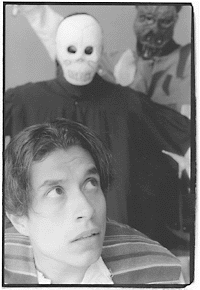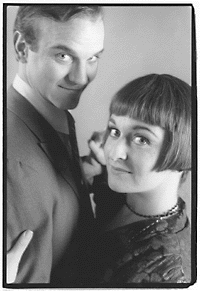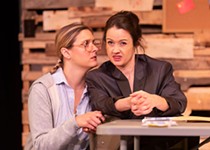Exhibitionism
Bocón: Filling the Air with Color
Fri., Oct. 24, 1997
Theatre Room, UT campus
through October 26
Running time: 1 hr
 Without fireworks, there would be no fiesta. Colorful explosions of light let you know there's a party going on somewhere. Bastille Day. Diez y Seis. The Fourth of July. But there is a double edge to these bursts of contained energy. Fireworks also stand for the bombs that once exploded on those holidays, gunshots that were fired to win freedom. Francis Scott Key wrote the words to the U.S. national anthem by the light of those fireworks while people fought for their liberty. Fireworks can be pretty potent symbols when you get right down to it.
Without fireworks, there would be no fiesta. Colorful explosions of light let you know there's a party going on somewhere. Bastille Day. Diez y Seis. The Fourth of July. But there is a double edge to these bursts of contained energy. Fireworks also stand for the bombs that once exploded on those holidays, gunshots that were fired to win freedom. Francis Scott Key wrote the words to the U.S. national anthem by the light of those fireworks while people fought for their liberty. Fireworks can be pretty potent symbols when you get right down to it.
Bocón is full of fireworks of all shapes and sizes. Lisa Loomer's script seems simple on its surface -- the quaint story of a boy's search for his own voice -- but this straightforward theme becomes complicated by the presence of soldiers and the threat of disappearance. It is a tale for those at war, for people who attempt to lead ordinary lives despite the fireworks around them. Bosnia, Chiapas, Vietnam, the British Colonies -- you could be almost anywhere and anywhen when you look at the messages in the words.
But Bocón's culture is firmly rooted in La Frontera, the border between Mexico and the U.S. This UT Department of Theatre and Dance production turns the Theatre Room into a riot of color and music that explodes once the show begins. There is an amazing amount of potential energy in Amy Deuchler's carnival-like lights and Simone C. Williams' folk-inspired costumes, and on Phil Shing-Wu Lin's salsa-dancing set. Largely, these dynamic designs are converted into fireworks by the fiercely physical and exciting performances by the talented ensemble cast, with stand-out portrayals by Roland F. Gonzales as Miguel, the Bocón, Bina Chauhan as La Llorona, and Michelle Gil as Ana.
Some of the created heat and light simply evaporates into smoke and dust, despite director Amparo Garcia's nonstop, textually inspired movement and the script's breakneck pace. Some of the actors' own voices are completely lost in the sea of sounds created by the amplified band and Alex Herrin's audio design. Lin's set, while keyed into the concept of the show, spends too much time being manipulated by the actors and crew, killing the rhythm that Garcia has developed and distracting the audience from the play's more poignant moments.
Despite the few duds, there are still fireworks. When all of the pieces fall into place, the fuse is lit, the charge zips into the air, and it fills the night with glorious color, you know that you are witnessing something special.
-- Adrienne Martini
HOLIDAY: CAN'T BUY ME LOVE
B. Iden Payne Theatre, UT campus
through October 26
Running time: 2 hrs, 20 min
 Money -- either it serves you or you serve it. If you're willing to let it flow in and out of your life, to acquire it as you need to but let it go when it can be used to attain something which adds greater worth to your life, you can be money's master. If, however, you become absorbed in the accumulation of wealth to the point that you will sacrifice other interests and desires, even relationships with loved ones, to gain it or retain what you have for the status or privilege it provides, you will be money's slave.
Money -- either it serves you or you serve it. If you're willing to let it flow in and out of your life, to acquire it as you need to but let it go when it can be used to attain something which adds greater worth to your life, you can be money's master. If, however, you become absorbed in the accumulation of wealth to the point that you will sacrifice other interests and desires, even relationships with loved ones, to gain it or retain what you have for the status or privilege it provides, you will be money's slave.
Johnny Case always figured himself for the former. In fact, the hero of this Phillip Barry romantic comedy planned his life around mastering money. From the age of 10, when he took his first job, he dreamed of working just long enough to gain the funds it would take for him to live life fully, after which he'd go on permanent holiday. He was in sight of it when he met Julia Seton and lost his heart to this daughter of Fifth Avenue affluence. But in the course of the play, Johnny learns that wedding Julia means abandoning his dream of financial independence and yoking himself to the Seton world: to jobs that pay ever-escalating salaries, to homes of conspicuous opulence, to society that links value to financial standing -- in short, to a life in the service of money. He will have to become one of them.
In this UT Department of Theatre & Dance production, it's easy to see what Johnny is up against. The room in the Seton manse that designer Mark Ridgeway has created for the first act is a cathedral to Mammon. Elegant paneled walls rise high in the air, their wood glowing warmly under Jon Smith's lights; tall columnar windows dwarf the humans who pass before them; and an almost life-size full-length portrait of Grandfather Seton (cannily painted to resemble David Nancarrow, who plays Julia's father) pays domineering tribute to the fortune he left his family. The worship of wealth is further enforced by Nancarrow's gruff patriarch, beaming at Johnny's money-making ingenuity and curtly dismissing any suggestion that there's more to life than money, and Jennifer Don's Julia, who stiffens visibly whenever her fiancé proposes a simpler -- i.e., less prosperous -- existence.
Of course, it's also easy to stay in Johnny's corner, not only because of the way Barry has written the character -- he's virtuous without being saintly -- but because of the way James Elliott plays him. He makes clear the drive and decency in Johnny -- you can picture him rolling up his sleeves and putting in 16-hour days -- and appears genuinely devoted to Julia. Backing him are a similarly appealing crew: Johnny's friends the Potters, played with real vivacity by Lawrence Averill and Sharron Bower; Julia's droll, defeated brother Ned, whose bitterness is softened and made almost Chekhovian by Eric Peterson; and Julia's sister Linda, a kindred spirit to Johnny who, in Stacey Sperling's performance, matches Elliott in resolution and earnestness. The actors don't only make the characters likable, though; they also delineate cleanly the moral challenges they face.
That may be the hallmark of this production: Director Kathryn Long really gets the play's moral heart to center stage and makes it just as prominent as the romance or the comedy. The show does suffer a bit from a certain slackness of pace; at times, it sounds rather like a 45 played at 331/3 rpms: not so slow as to distort the words but enough to dull their edges and remove some of the urgency of emotion. Averill and Bower are the most adept at delivering Barry's banter; they toss it off with light disregard, like a wisecrack at a party, and the sense stays bright and crisp. But the fact that the show doesn't race is no fatal flaw. Ultimately, as with Johnny, the production's virtues make it easy to stay in its corner, where we're reminded that money can't buy us love. -- Robert Faires
FLAME FAILURE, EPISODE 6: BACK ON TRACK
The Public Domain Gallery,
through October 26
Running Time: 40 min
About a decade ago, someone introduced me to Infocom. For those of you who have only a murky memory of computer fads of the Eighties, Infocom was a game at its most stripped down, only text in pulsing green on a black screen. The play could be maddening, full of detailed steps that had to be completed in exactly the right order in order to finish the objective and move on.
Playwright Dan Bonfitto has written a series of plays that are like these games, full of absurd yet sublime steps that seem actually to be leading to a maddening yet worthwhile goal. While the previous two installments of Flame Failure have been shaky, the Downstage Players are back on track with Episode 6, The Algebra of Sacrifice. Fine performances by Marco Noyola, Anne Engelking, and Miriam Yucht, as well as Noyola's set design, helped pull this exciting idea back from the brink. A lot of the credit, however, needs to go Michael Stuart for his rich performance as the Hobo King, the last person who saw the book that the three competing groups have been searching for in the last five episodes. Stuart is magnetic even when he is simply listening to another character speak, almost as if he is magnetically concentrating on the text as it scrolls by, plotting the next counter-intuitive step that will lead him to his goal. -- Adrienne Martini








